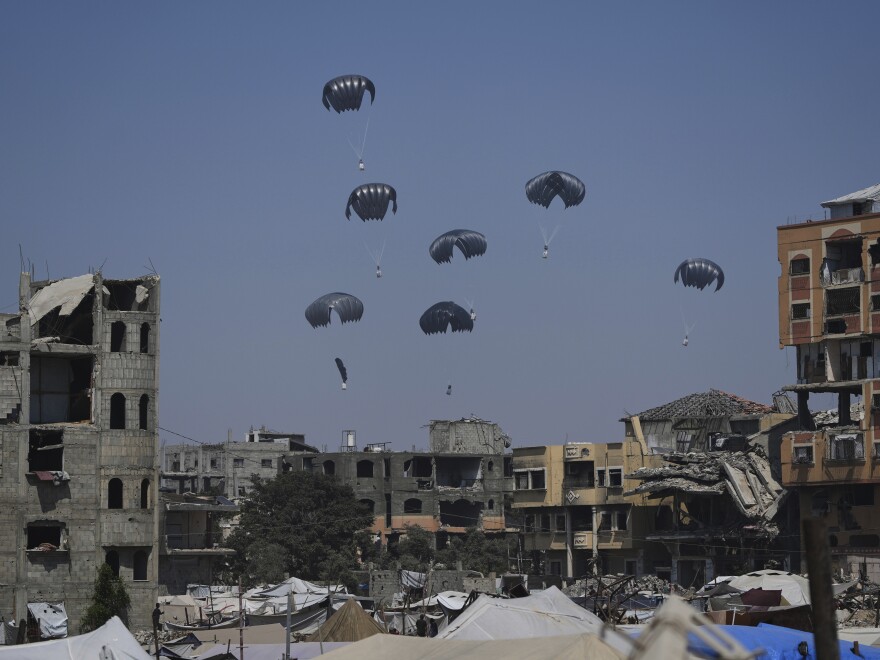Updated @ 9:36 PM EDT on July 27, 2025
In order to allow additional food supplies to enter the besieged areas, Israel’s military would halt fighting in Gaza’s main population centers for ten hours every day, the country declared over the weekend. Limited relief supplies were sent into Gaza on the first day of the halt.
In Gaza City, Deir al Balah, and Al-Mawasi, a sizable tent camp near the shore, military operations will take a daily break starting at 10 a.m. on Sunday and last until 8 p.m. Israel has instructed Palestinians to seek refuge in those locations because to the continued hostilities.
Israel’s offensive in Gaza has undergone a significant shift in response to mounting international criticism of its limitations on the delivery of humanitarian aid. Gaza is experiencing widespread malnutrition, according to the World Health Organization, and last week, the president of the United Nations World Food Programme declared that the country’s food crisis had reached “new and astonishing levels of desperation.”
Since the conflict started in October 2023, 133 Palestinians—including 87 children—have perished from starvation and malnutrition, according to Gaza’s health ministry.
Israel denies there is starvation and blames Hamas and the United Nations
Starvation in Gaza has been disputed by the Israeli military, which claims it is a “false campaign promoted by Hamas.”
Journalists were shown hundreds of plastic-wrapped pallets with pasta, flour, oil, bottled water, and infant formula when Israeli military personnel led them into Gaza on Sunday through the Kerem Shalom border gate.
Elon Levy, a spokesman for the Israeli government, blamed the UN for this. “The aid is here in Israel,” he responded. “Israel is calling on the UN to fulfill its mandate. The United Nations is allowing hundreds and hundreds of pallets of goods to deteriorate in the heat. They are blaming Israel and acting as though Israel isn’t allowing this help to enter at all, rather than accepting responsibility for that failure.”
The U.N.’s World Food Programme said in a statement on Sunday that it has only imported a small portion of the aid required to support Gaza’s population since May 21 because doing so would be too dangerous. According to the report, the aid was provided in “extremely challenging circumstances that put civilians and aid workers at tremendous risk.”
Israeli authorities have accused Hamas of inciting unrest near Gaza’s assistance delivery centers. According to local health authorities and hospital morgue officials, the Israeli soldiers killed at least 94 Palestinians seeking food supplies in Gaza on Sunday.
The World Food Programme’s executive director, Cindy McCain, claimed on Sunday that the Israeli soldiers had opened fire on the frantic masses that rushed their vehicles. Although humanitarian groups praised Israel’s delay, they maintain that a ceasefire is necessary before the supplies can truly be delivered.
The U.S. pulled out of ceasefire talks
Last week, in the most recent attempt to stop the war that started with the Hamas-led attack on Israel that killed over 1,200 people, the United States withdrew from the most recent round of ceasefire negotiations in Doha, Qatar. In a statement, Special Envoy Steve Witkoff indicated that the United States will “consider alternative options to bring the hostages home and try to create a more stable environment for the people of Gaza” because Hamas “does not appear to be coordinated or acting in good faith.” He didn’t go into detail about what those possibilities might be.
Israel said that it coordinated with the United Nations and other international organizations to decide to halt hostilities in order to make it easier to distribute humanitarian aid.
Israel announced that it had increased water flow in Gaza by re-establishing a power line to a desalination facility and that airdrops carrying bread, sugar, and canned food will continue. Additionally, Israel announced that it was setting aside safe corridors for U.N. assistance vehicles to transport medication and food throughout Gaza.
The Jordanian Armed Forces reported on Sunday that it has coordinated with the United Arab Emirates to conduct one of three airdrops of 25 tons of humanitarian supplies and food aid in Gaza. According to the BBC, Jordan was also delivering food supplies into the region in 60 trucks.
More than 100 relief trucks were sent into Gaza on Sunday, according to the Egyptian Red Crescent, with more than 1,200 tons of food, over 840 tons of wheat, and other supplies.
Israel also stopped an aid ship run by the protest group The Freedom Flotilla Coalition that was headed for Gaza over the weekend. The ship was prevented by Israel’s military from “illegally entering the maritime zone of the coast of Gaza.” According to activists, the ship, named Handala, brought diapers, food, medicine, and baby formula, among other humanitarian items.
From Gaza, Eleanor Beardsley provided reporting.
Copyright 2025 NPR






